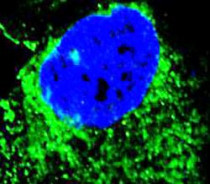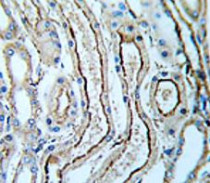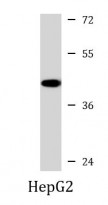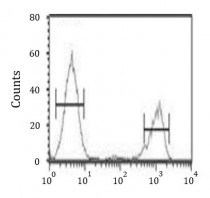ARG55167
anti-ADH7 antibody
anti-ADH7 antibody for Flow cytometry,ICC/IF,IHC-Formalin-fixed paraffin-embedded sections,Western blot and Human
Metabolism antibody; Signaling Transduction antibody
Overview
| Product Description | Rabbit Polyclonal antibody recognizes ADH7 |
|---|---|
| Tested Reactivity | Hu |
| Tested Application | FACS, ICC/IF, IHC-P, WB |
| Host | Rabbit |
| Clonality | Polyclonal |
| Isotype | IgG |
| Target Name | ADH7 |
| Antigen Species | Human |
| Immunogen | KLH-conjugated synthetic peptide corresponding to aa. 318-346 (C-terminus) of Human ADH. |
| Conjugation | Un-conjugated |
| Alternate Names | Alcohol dehydrogenase class IV mu/sigma chain; ADH4; EC 1.1.1.1; Alcohol dehydrogenase class 4 mu/sigma chain; Retinol dehydrogenase; Gastric alcohol dehydrogenase |
Application Instructions
| Application Suggestion |
|
||||||||||
|---|---|---|---|---|---|---|---|---|---|---|---|
| Application Note | * The dilutions indicate recommended starting dilutions and the optimal dilutions or concentrations should be determined by the scientist. | ||||||||||
| Positive Control | HepG2 |
Properties
| Form | Liquid |
|---|---|
| Purification | Purification with Protein A and immunogen peptide. |
| Buffer | PBS and 0.09% (W/V) Sodium azide |
| Preservative | 0.09% (W/V) Sodium azide |
| Storage Instruction | For continuous use, store undiluted antibody at 2-8°C for up to a week. For long-term storage, aliquot and store at -20°C or below. Storage in frost free freezers is not recommended. Avoid repeated freeze/thaw cycles. Suggest spin the vial prior to opening. The antibody solution should be gently mixed before use. |
| Note | For laboratory research only, not for drug, diagnostic or other use. |
Bioinformation
| Database Links |
Swiss-port # P40394 Human Alcohol dehydrogenase class 4 mu/sigma chain |
|---|---|
| Gene Symbol | ADH7 |
| Gene Full Name | alcohol dehydrogenase 7 (class IV), mu or sigma polypeptide |
| Background | This gene encodes class IV alcohol dehydrogenase 7 mu or sigma subunit, which is a member of the alcohol dehydrogenase family. Members of this family metabolize a wide variety of substrates, including ethanol, retinol, other aliphatic alcohols, hydroxysteroids, and lipid peroxidation products. The enzyme encoded by this gene is inefficient in ethanol oxidation, but is the most active as a retinol dehydrogenase; thus it may participate in the synthesis of retinoic acid, a hormone important for cellular differentiation. The expression of this gene is much more abundant in stomach than liver, thus differing from the other known gene family members. Alternative splicing results in multiple transcript variants. [provided by RefSeq, Oct 2009] |
| Function | Could function in retinol oxidation for the synthesis of retinoic acid, a hormone important for cellular differentiation. Medium-chain (octanol) and aromatic (m-nitrobenzaldehyde) compounds are the best substrates. Ethanol is not a good substrate but at the high ethanol concentrations reached in the digestive tract, it plays a role in the ethanol oxidation and contributes to the first pass ethanol metabolism. [UniProt] |
| Cellular Localization | Cytoplasm. |
| Research Area | Metabolism antibody; Signaling Transduction antibody |
| Calculated MW | 41 kDa |
Images (4) Click the Picture to Zoom In
-
ARG55167 anti-ADH7 antibody ICC/IF image
Immunofluorescence: NCI-H460 cells stained with ARG55167 anti-ADH7 antibody (green). DAPI (blue) for nuclear staining.
-
ARG55167 anti-ADH7 antibody IHC-P image
Immunohistochemistry: Formalin-fixed and paraffin-embedded lung tissue stained with ARG55167 anti-ADH7 antibody.
-
ARG55167 anti-ADH7 antibody WB image
Western blot: 35 µg of HepG2 cell lysate stained with ARG55167 anti-ADH7 antibody at 1:1000 dilution.
-
ARG55167 anti-ADH7 antibody FACS image
Flow Cytometry: K562 cells stained with ARG55167 anti-ADH7 antibody (right histogram) or without primary antibody control (left histogram), followed by incubation with FITC labelled secondary antibody.









